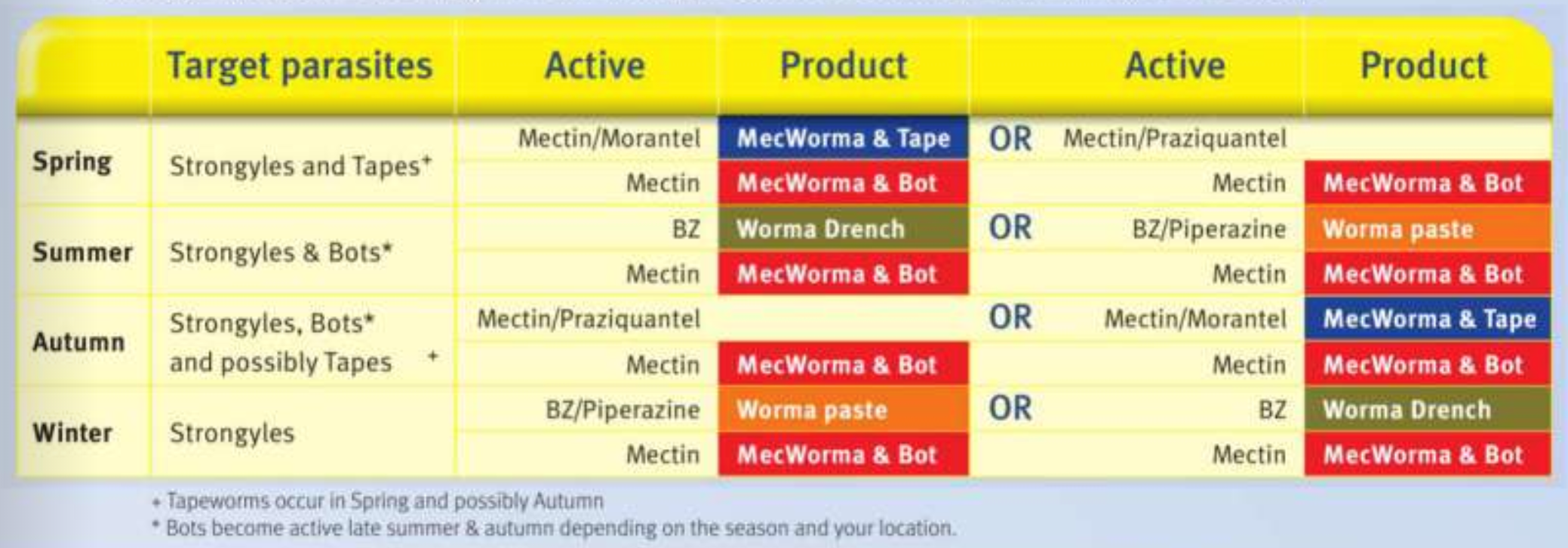When it comes time to worm your horse, making a choice regarding which wormer to use can sometimes be overwhelming and confusing. If you haven’t already had a read, you can check out our other article about horse wormers here.
While we often refer to three main classes of horse worming drugs, there are actually six broader classes of compounds:
| Class of Drug | Action |
| Macrocyclic lactones (mectins): including abamectin, moxidectin, ivermectin | Broad spectrum anti-parasitic activity, including against bots |
| Benzimidazoles (BZs): including oxibendazole, oxfendazole, febendazole, febantel | Broad spectrum wormer |
| Tetrahydropyrimidines: pyrantel and morantel | Broad spectrum wormer plus one species of tapeworm |
| Isoquinolones: praziquantel | Effective against three species of tapeworm |
| Heterocyclic: piperazine | Strongyles and especially roundworms |
| Organophosphates: dichlorvos and trichlorfon | Mostly effective against bots and some worms |
When choosing an appropriate wormer for your horse, it is important to realize that no single drug is effective against all types of worms, and that is why most products will contain a combination of drugs.
IAH MecWorma
International Animal Health (IAH) offer a range of worming products for your horse. They are very affordable, while offering effective parasite control for the whole year. IAH MecWorma & Tape is a highly effective broad spectrum drench that can achieve up to 100% worm kill rate (including BZ-resistance strains). It uses a combination of two drugs from different classes: abamectin and morantel tartarate. These are both broad spectrum drugs, which when combined, offer treatment and control of both large and small strongyles, tapeworm, cutaneous onchocerciasis and nematodes including Habronema and Draschia species. which cause skin lesions (summer sores).
Below is an example of a worming strategy that you might wish to use throughout the year, courtesy of International Animal Health. Of course, the program you adopt and the products you choose to use will depend on many factors such as your location, grazing pressure, stocking rates, etc. The table gives two suggested worming programs, assuming two wormings per season.

Image credit: www.iahp.com.au
Alongside your worming program, it is important to employ other strategies to keep worm burdens on your property and in your horse low. These include:
- Weekly remove of manure from paddocks and stables
- Spelling paddocks in summer where possible
- Cross-grazing pastures with sheep or cattle for around six months at a time
- Quarantining of new horses
- Use faecal egg counts (see your veterinarian) to determine a worming schedule.
If you need to know more about IAH MecWorma, enquire now. Order now online!



